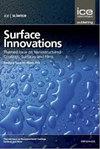Study of excitation wavelength dependent photoluminescence and electrical conductivity on chemically synthesized metal semiconductor copper oxide nanorods
IF 3.5
4区 材料科学
Q3 CHEMISTRY, PHYSICAL
引用次数: 0
Abstract
This research work reports the synthesis of copper (II) oxide (CuO) nanoparticles using the wet chemical co-precipitation method. The synthesised nanoparticles were characterised using ultraviolet–visible spectroscopy, X-ray diffraction, field emission scanning electron microscopy with energy-dispersive X-ray spectroscopy and high-resolution transmission electron microscopy in terms of absorption, crystal structure and size, morphology and elemental composition, and particle size. The existence of functional groups was verified by Fourier transform infrared spectroscopy. The synthesised copper (II) oxide nanoparticles showed an absorption peak at 397 nm, and a Tauc’s plot study showed a band-gap energy of 3.2 eV. The effects of varied excitation energies – namely, 3.81 and 3.54 eV – on the emission spectra of rod-shaped nanoparticles were assessed through photoluminescence spectroscopy, and the release of red, orange, green, violet and yellow colours was observed. The voltage–current characteristics of nanoparticle pellets were measured using a two-probe technique. The increase in the direct-current electrical conductivity of pellets heated at 100 and 200°C was ascertained. Overall, this research work provides valuable insights into the electronic properties of copper (II) oxide nanoparticles, which could have potential applications in various fields such as catalysis and electronics.化学合成金属半导体氧化铜纳米棒的激发波长依赖性光致发光和电导率研究
本研究报道了采用湿化学共沉淀法合成氧化铜纳米粒子。利用紫外可见光谱、x射线衍射、场发射扫描电镜和能量色散x射线能谱以及高分辨率透射电镜对合成的纳米颗粒进行了吸收、晶体结构和尺寸、形貌和元素组成以及粒径的表征。傅里叶红外光谱验证了官能团的存在。合成的氧化铜纳米粒子在397 nm处有一个吸收峰,Tauc图研究显示其能带能为3.2 eV。利用光致发光光谱法研究了不同激发能(3.81 eV和3.54 eV)对棒状纳米颗粒发射光谱的影响,并观察了红、橙、绿、紫和黄等颜色的释放。采用双探针技术测量了纳米颗粒的电压-电流特性。测定了球团在100℃和200℃加热时直流电导电性的增加。总的来说,这项研究工作为铜(II)氧化物纳米粒子的电子性质提供了有价值的见解,这可能在催化和电子等各个领域有潜在的应用。
本文章由计算机程序翻译,如有差异,请以英文原文为准。
求助全文
约1分钟内获得全文
求助全文
来源期刊

Surface Innovations
CHEMISTRY, PHYSICALMATERIALS SCIENCE, COAT-MATERIALS SCIENCE, COATINGS & FILMS
CiteScore
5.80
自引率
22.90%
发文量
66
期刊介绍:
The material innovations on surfaces, combined with understanding and manipulation of physics and chemistry of functional surfaces and coatings, have exploded in the past decade at an incredibly rapid pace.
Superhydrophobicity, superhydrophlicity, self-cleaning, self-healing, anti-fouling, anti-bacterial, etc., have become important fundamental topics of surface science research community driven by curiosity of physics, chemistry, and biology of interaction phenomenon at surfaces and their enormous potential in practical applications. Materials having controlled-functionality surfaces and coatings are important to the manufacturing of new products for environmental control, liquid manipulation, nanotechnological advances, biomedical engineering, pharmacy, biotechnology, and many others, and are part of the most promising technological innovations of the twenty-first century.
 求助内容:
求助内容: 应助结果提醒方式:
应助结果提醒方式:


